Not by bread alone: tobacco, alcohol and sweets in the Red Army
Categories: History
By Pictolic https://pictolic.com/article/not-by-bread-alone-tobacco-alcohol-and-sweets-in-the-red-army.html80 years ago, the Chairman of the State Defense Committee (GKO) of the Soviet Union, Joseph Stalin, signed Resolution No. 562 "On the introduction of vodka for supply in the active Red Army", according to which soldiers were supposed to be given half a glass of "fuel"every day.
It is known that in order for a soldier to fight well, he must be armed, appropriately dressed and, of course, well fed. A lot has been said about what kind of porridge was cooked by the army field kitchens of the Great Patriotic War and how much bread was put to the soldier per day. But at the same time, most historians ignore other, no less important elements of the Red Army soldier's allowance – sweets, tobacco and alcohol. We will correct this omission and tell you about the supply of these products to the Red Army.
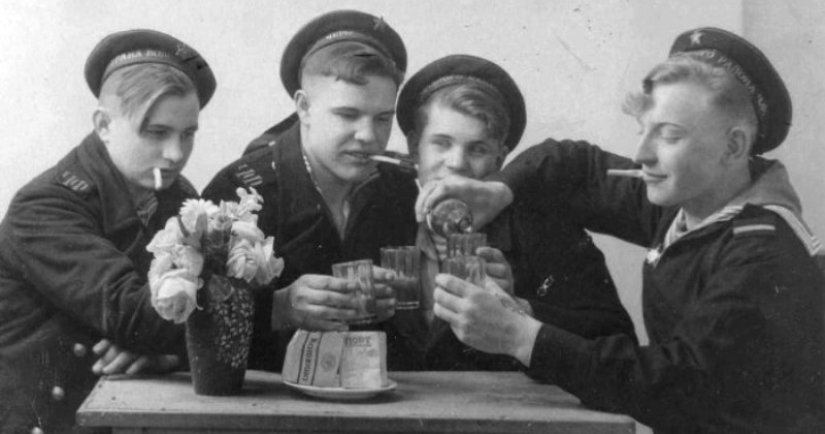
Today, the topic of supplying the Red Army soldiers with the notorious "Narkomovsky" hundred grams of alcohol is being actively discussed. There are a lot of opinions on this issue, from full approval, to accusing the command of soldering soldiers. Of course, sitting at home near the computer, it's easy to talk about this topic, but who are we to judge people who have won us Victory with sweat and blood?
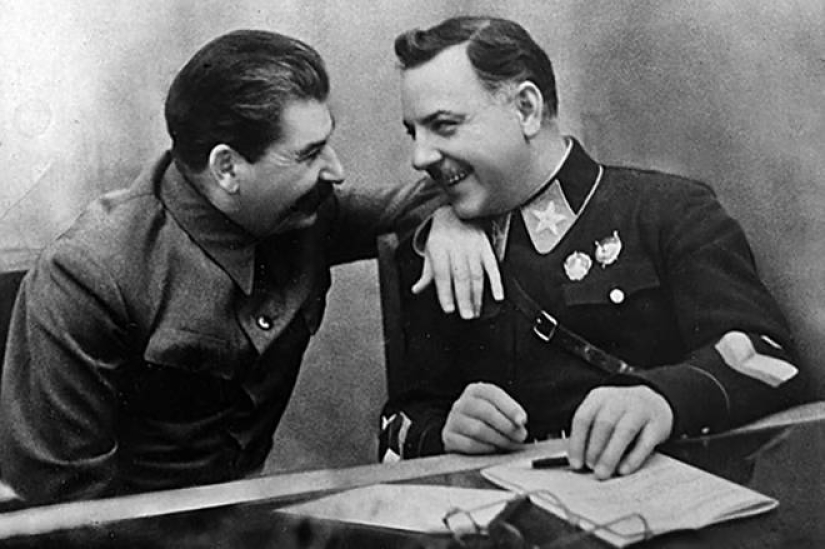
It is worth noting that there has never been any soldering in the Red Army and the issuance of alcohol has always been under the strictest control. For the first time, alcohol was given to soldiers in the "winter war" with Finland, and the People's Commissar of Defense Kliment Efremovich Voroshilov initiated this. That is why the soldier's portion of 100 grams at the front was called "narkomovsky".
We are well aware that alcohol does not save us from the cold, but in those days we still firmly believed that vodka or alcohol should be drunk in the cold "for a snowdrift". They also seriously believed that alcohol was an excellent prevention of colds, which were the scourge of the army in the autumn-winter period. It is possible that the placebo effect worked, but at the front it actually often helped.
By the way, the correctness of the name "Narkomovsky" for front-line 100 grams can be disputed, since from the very beginning of the war until the Victory, the issuance of alcohol to soldiers of all branches of the armed forces was under the personal control of Comrade Stalin. The leader personally reviewed the rations and signed all the documents about the changes with his own hand.
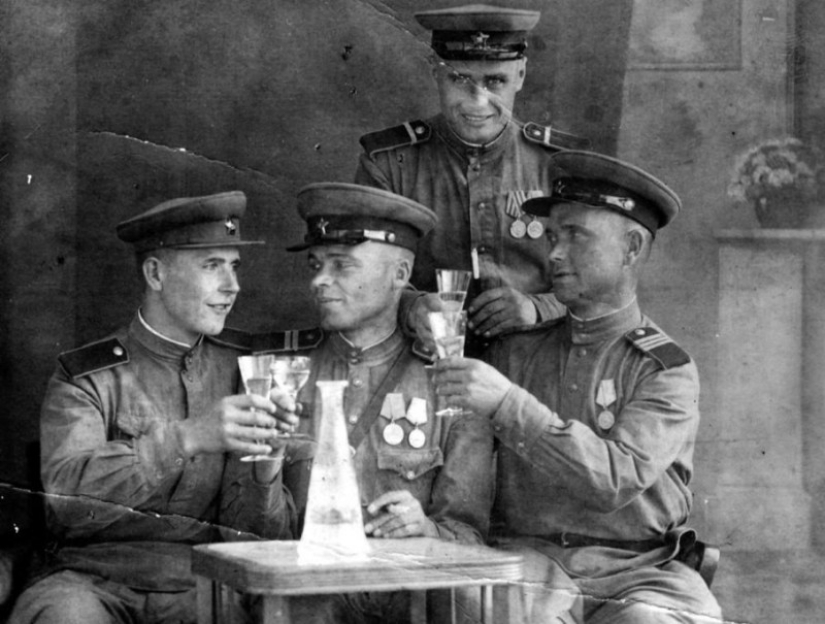
Joseph Vissarionovich was not against alcohol, but he was a supporter of moderation and an enemy of drunkenness. That is why there was nowhere for drinkers to roam in the active army. The resolution of the State Defense Committee of August 22, 1941 "On the introduction of vodka for supply in the active Red Army" determined that only those who were "in the first line of the active army", that is, on the front line, received a strong drink in the amount of 100 grams per day.
So it was a little less than a year, until in May 1942, Stalin corrected the project with his famous red pencil, mercilessly tightening the rules. From now on, not all fighters could count on the" People's Commissariat", but only those who participate in offensive operations. The Supreme Commander crossed out the abstract definition of "having success in combat operations" and a double dose of 200 grams for those who distinguished themselves.
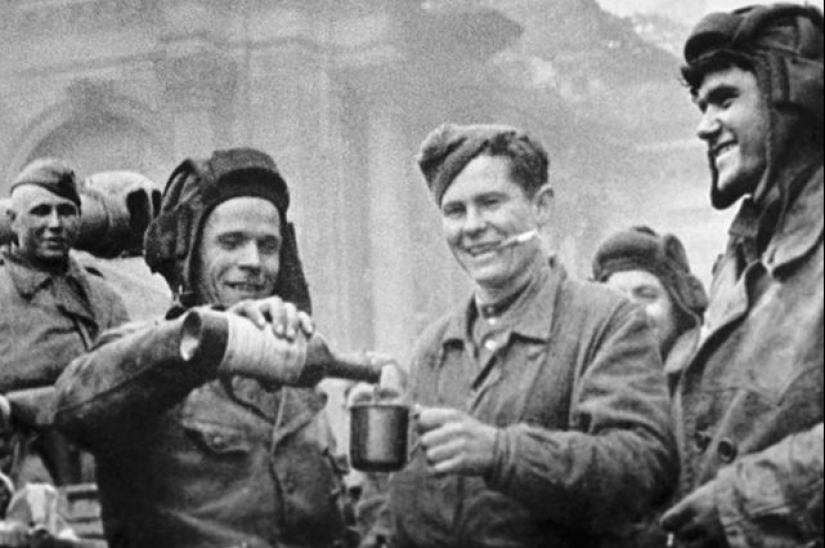
Stalin allowed the issuance of hot drinks on public holidays, on the anniversary of the formation of the unit and for some reason on the Day of the Physical education student. The International Youth Day was removed from the list of "alcoholic" dates, and the professional holiday of aviators, on the contrary, was added.
In November 1942, just before the beginning of the Battle of Stalingrad ,the "Narkomovsky" was returned in full for all fighters on the front line. In addition, 50 grams were given to soldiers of regimental and divisional reserves, construction workers and, in general, everyone who was in the combat zone. They did not forget about the wounded – those who did not have medical contraindications were also given 50.
In April 1943, the order was again revised by Stalin and extradition was allowed only in units leading the offensive. In May 1945, immediately after the Victory ,the "People's Commissariat" was completely abolished for all categories – in peacetime, alcohol was banned in the troops.
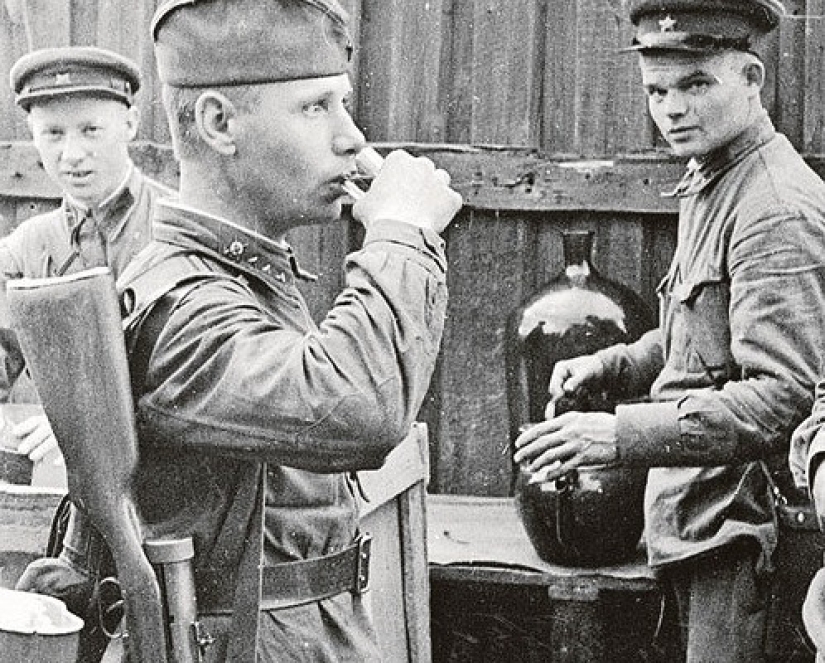
It should be particularly noted that the type of alcohol and its quantity could differ by the types of troops and places of deployment of units. For example, the Transcaucasian front was supplied not with vodka and alcohol, but with wine, taking into account the specifics of the region. The soldiers were supposed to have 300 grams of dry wine or 200 fortified.
In addition, Red Navy submariners received wine. These guys had an iron rule-drink or refuse. It was forbidden to transfer one's portion to another. For those who refused wine, compensation was provided in the amount of 10 rubles per serving. In the 40s, it was good money and there were a lot of teetotallers.
Tobacco distribution has not experienced such radical changes. From the first days of the Great Patriotic War, the Red Army began to issue 20 grams of shag to each fighter. In addition to tobacco, seven special "books" of smoking paper and three boxes of matches were relied on monthly.
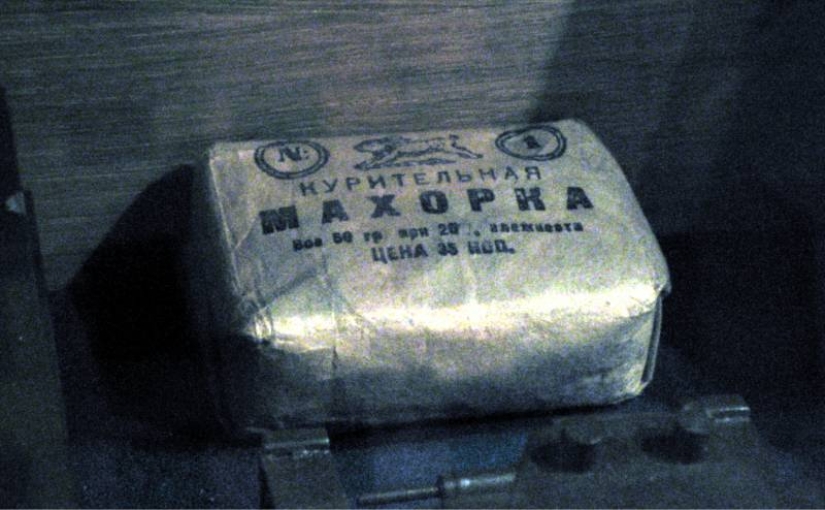
As for the matches, it should be said that they were not very relevant in the conditions of the front. Despite all sorts of tricks, they got wet and those who relied on them could be left without a "light". In order not to deprive themselves of small front-line joys and to have a reliable source of flame with them, the soldiers made katyusha rifles from spent rifle cartridges – primitive, but incredibly reliable gasoline lighters.
Often there were problems with smoking paper. The fighters secretly used the press left over from political information for self-rolling. The domestic "Red Star" and... Hitler's leaflets with a proposal to surrender were well suited for this. However, in the latter case, it was worth being vigilant, since the enemy propaganda found by the special agent in the pocket of the tunic could send the smoker to the penal battalion.
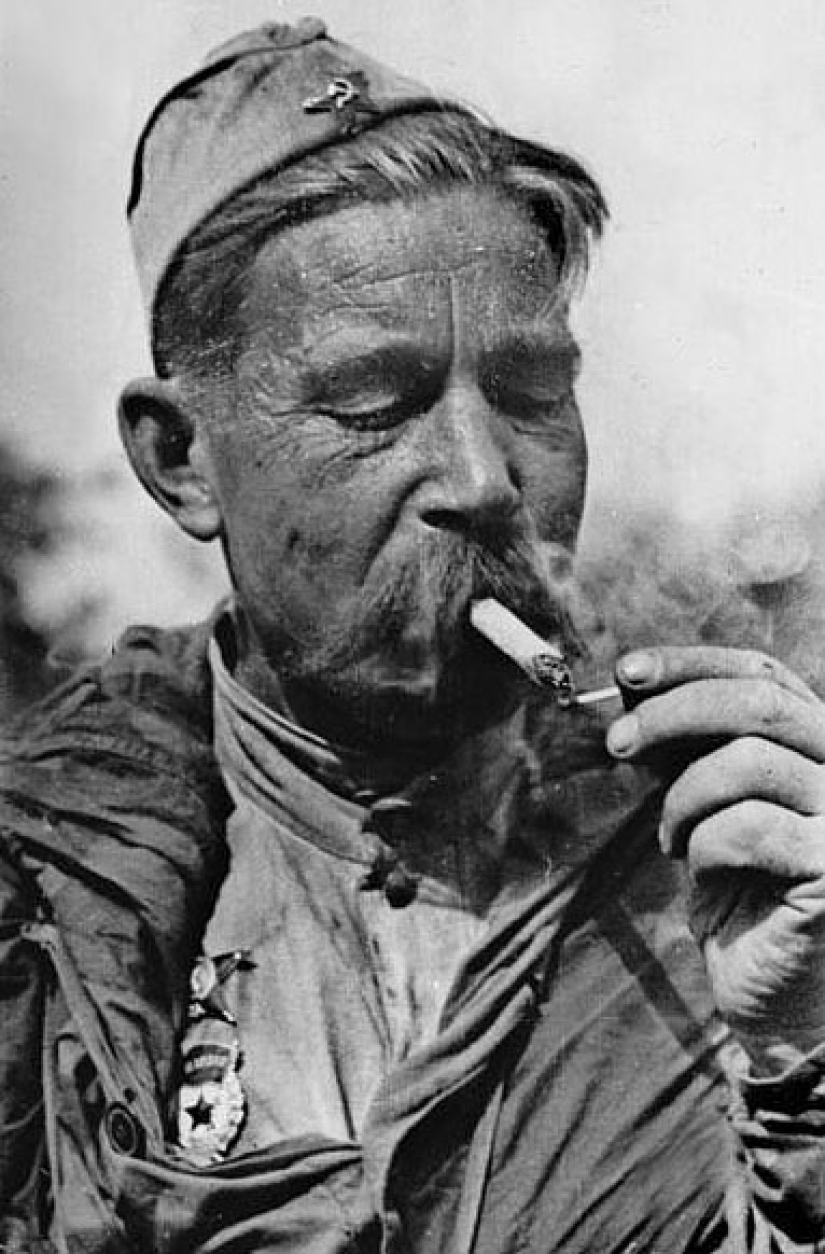
Tobacco was also not always enough, so resourceful soldiers got out of the situation as best they could. At the front, in addition to shag, there were such types of smoking as "Vyrviglaz", "Grandmother's mattress" and "Light up the fascist". These smoking mixtures were prepared from different components that are not always suitable for smoking. For example, "tobacco" with the unusual name "berklen" was prepared by mixing dried birch and maple leaves.
Despite the shortage of tobacco, captured German products were quoted extremely low in the Red Army. It was not about ideology at all, but about quality. The fighters said that German smoking tobacco and cigarettes were "smelly, but without strength" and smoked them when they ran out of "berkelens" and other surrogates.
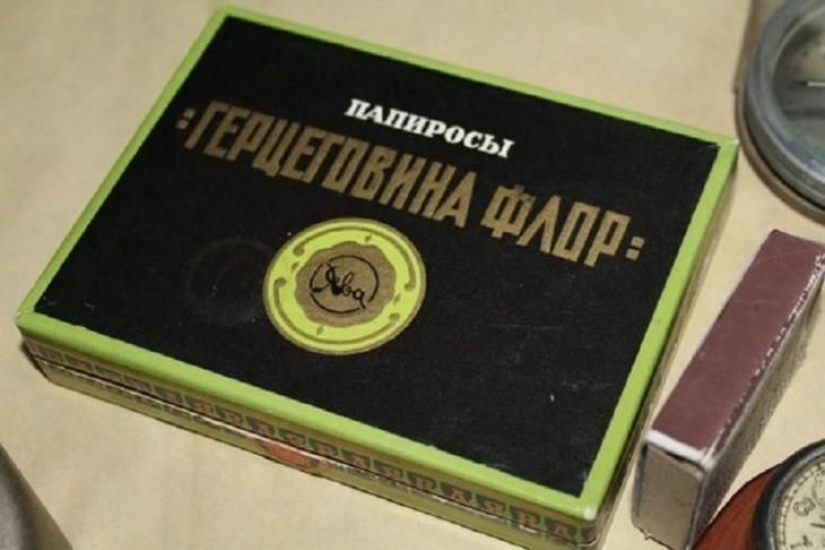
But American cigarettes, such as the "Camel" obtained under Lend-Lease without a filter, were in the price of our soldiers. The pilots were provided with tobacco products better than others, as they were given 25 cigarettes or 25 grams of tobacco per day. The immortal "Belomorkanal" was in particular demand, but "Kazbek" was already considered a premium-class product and these cigarettes were smoked by the command staff.
As for the supreme commander-in-chief, Comrade Stalin, he preferred the cigarettes of the Moscow factory "Java" "Herzegovina Flor", from which he extracted tobacco for stuffing his legendary pipe.
The appearance of various delicious things at the front is inextricably linked with smoking. At the beginning of the war, it never occurred to anyone to spoil the soldiers with sweets – times were difficult and even the soldiers were very happy to have a piece of refined sugar for tea. Although according to the norms introduced for the front, everyone was given 35 grams a day, in fact, sugar was rarely seen in the trenches.
The pilots received chocolate and condensed milk in dry rations, almost without interruptions, and were much happier in this respect than others. In August 1942, the People's Commissariat made a revolutionary decision – from now on, women who refused tobacco products had to receive 200 grams of chocolate or 300 grams of sweets every month.
Within three months, the directive was extended to all fighters and commanders, all branches of the armed forces and fronts. Non-smokers received sweets and chocolate, but if there were interruptions with these products, then 300 grams of sugar per month, in excess of the required 35 grams per day.
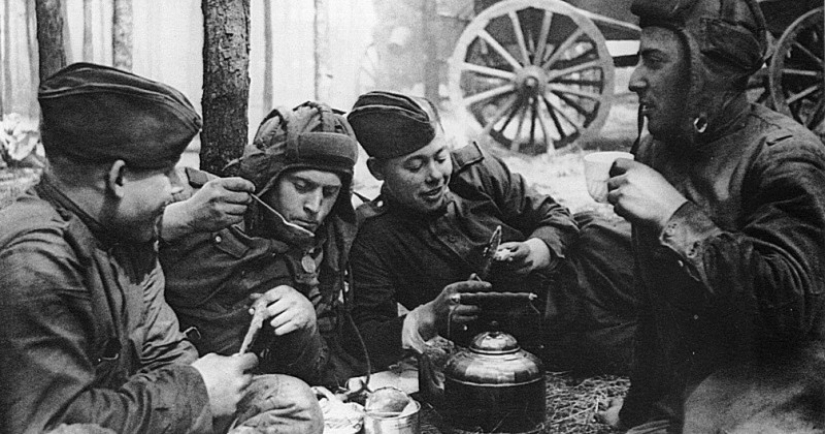
Those who like to talk about the general front-line drunkenness can be answered that not everyone drank 100 grams of" narkomovsky". Most often, alcohol was consumed after the battle, commemorating fallen comrades, or on holidays. It was well known to everyone that alcohol drunk before a fight could lead to trouble, and therefore most soldiers clearly knew the norm.
A huge country worked so that they could reach Berlin, supplying soldiers with weapons, ammunition, uniforms, food. We tried to maintain the supply at a high level and the fact that there were interruptions with tobacco or sugar somewhere was definitely not the fault of the rear. But today it does not matter at all – a soldier drank before the battle, limited himself to a skinny front-line cigarette or chewed candy, because the main thing is that these guys won the Victory.
Keywords: War | History | Candy | Victory | Tobacco | Sugar | Vodka | Front | Fascists | The great Patriotic war
Post News ArticleRecent articles

It's high time to admit that this whole hipster idea has gone too far. The concept has become so popular that even restaurants have ...

There is a perception that people only use 10% of their brain potential. But the heroes of our review, apparently, found a way to ...
Related articles

In the fall of 1972, Bill Yates traveled through the countryside in the vicinity of Tampa, Florida. At that time, he was studying ...

When a person is in a life-threatening situation is awful, but even worse when it happens to a child. 11-year-old American Terry ...

Remember how broke the "unbreakable" scoop? The photo preserved in the photo album of almost every family! A selection of vintage ...

New Year's is a time to surprise and delight loved ones not only with gifts but also with a unique presentation of the holiday ...